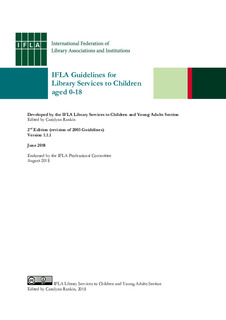Please use this identifier to cite or link to this item:
https://repository.ifla.org/handle/123456789/171Full metadata record
| DC Field | Value | Language |
|---|---|---|
| dc.rights.license | CC BY 4.0 | en_US |
| dc.contributor.author | IFLA Libraries for Children and Young Adults Section | - |
| dc.contributor.editor | Rankin, Carolynn | - |
| dc.date.accessioned | 2021-02-08T15:51:52Z | - |
| dc.date.available | 2018-11-07 | - |
| dc.date.available | 2021-02-08T15:51:52Z | - |
| dc.date.issued | 2018-11 | - |
| dc.identifier.uri | https://repository.ifla.org/handle/123456789/171 | - |
| dc.description.abstract | The IFLA Libraries for Children and Young Adults Section (C&YA Section) have undertaken this revision of the Guidelines for Children's Libraries Services, last published in 2003, to represent good practice in library services for children. The IFLA standards are internationally reviewed, published and regularly updated documents and each reflects current consensus on principles, guidelines, best practice or models for a particular activity or service. It is acknowledged there are significant differences in the current state of public libraries across the world. For many children’s librarians these IFLA Guidelines will be aspirational as they strive to meet the basic provision of books and to support reading. The Guidelines are not a set of rules for designing an ideal library service for children of all abilities. They suggest what may be feasible while being aware there are wide differences in social, cultural and economic circumstances in developing, middle income and industrialized countries. Each public library has a different community to serve and therefore different priorities and user needs. The IFLA Guidelines for Library Services for Children Aged 0-18 can be used to support the development and improvement of library services for children in all regions of the world. These Guidelines promote and encourage the development of effective library services for children of all abilities by giving guidance to the international library community about children's needs and rights on information, literacy and reading. The intention is to help public libraries implement high quality children's services in the digital age and recognising the changing role of the library in modern society. The IFLA Global Vision discussion shows that libraries are deeply committed to core roles in supporting literacy, learning and reading and are focused on our communities. Quality of education and universal literacy is recognised in the vision for the United Nations 2030 Agenda for Sustainable Development. The revised Guidelines provide up to date knowledge and professional insight for those who strategically plan or deliver children's library services and programmes. They are aimed at practicing librarians, library staff, library managers and administrators and the students and lecturers in library and information studies faculties. The Guidelines can help to inform decision makers and those involved in developing policies. The information will also benefit non-government organisations (NGOs) who support literacy and reading programs for children and their families. | en_US |
| dc.language.iso | en | en_US |
| dc.publisher | International Federation of Library Associations and Institutions (IFLA) | en_US |
| dc.relation.replaces | https://repository.ifla.org/handle/123456789/169 | en_US |
| dc.rights.uri | https://creativecommons.org/licenses/by/4.0/ | en_US |
| dc.subject | Subject::Children | en_US |
| dc.subject | Subject::Management | en_US |
| dc.subject | Subject::Young adults | en_US |
| dc.subject | Subject::Libraries for children | en_US |
| dc.title | IFLA Guidelines for Library Services to Children aged 0-18 – 2nd Edition (revision of 2003 Guidelines) | en_US |
| dc.type | Standards | en_US |
| dc.audience | Audience::Libraries for Children and Young Adults Section | en_US |
| dc.audience | Audience::IFLA Standards | en_US |
| ifla.oPubId | 67343 | en_US |
| ifla.Unit | Units::Section::Libraries for Children and Young Adults Section | en_US |
| Appears in Collections: | IFLA Publications | |
Files in This Item:
| File | Description | Size | Format | |
|---|---|---|---|---|
| ifla-guidelines-for-library-services-to-children_aged-0-18.pdf | IFLA Guidelines for Library Services to Children aged 0-18 | 633.72 kB | Adobe PDF |  View/Open |
This item is licensed under a Creative Commons License

